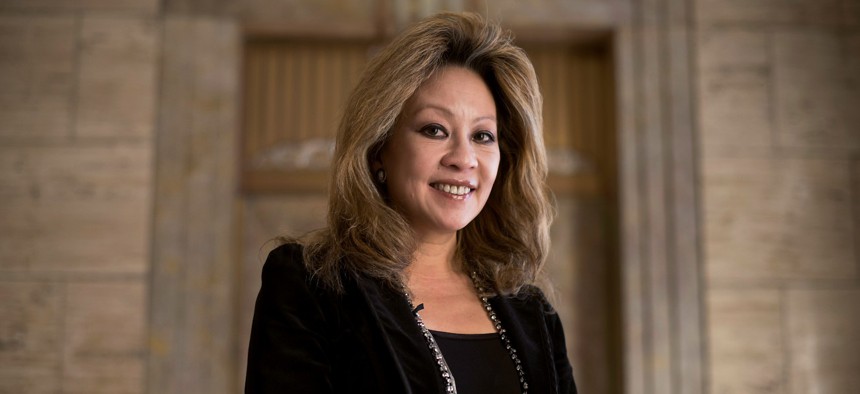
Susan Tsui Grundmann, at the Library of Congress John Adams Building, on Jan 26, 2017. Grundmann was nominated by Biden nine months ago. Tom Williams /Getty Images
With a Senate Confirmation Vote, A Federal Labor Relations Board is Back in Democratic Control
The Senate voted 50-49 to confirm former MSPB Chairwoman Susan Tsui Grundmann as a member of the Federal Labor Relations Authority.
The Senate last week voted 50-49 to confirm former MSPB Chairwoman Susan Tsui Grundmann as a member of the Federal Labor Relations Authority, finally putting Democrats in control of the agency that governs collective bargaining at federal agencies.
The vote, in which Sen. Lisa Murkowski, R-Alaska, broke ranks and joined all Democrats (Sen. Patrick Leahy, D-Vt., did not vote), comes nine months after Biden nominated Grundmann and nearly 15 months after Biden was sworn into office.
Once a relatively low-key agency that investigated allegations of unfair labor practices in the federal government, the FLRA’s actions grew controversial during the Trump administration, as it became a key player in the White House’s efforts to rewrite federal labor law and disempower unions.
The Trump-era Republican majority broke with decades-old practice of only issuing decisions based on discrete conflicts between labor and management, issuing a series of so-called “general statements of policy” to reverse decades of precedent, eliminating labor organizations’ rights to negotiate over issues that come up between collective bargaining agreements and narrowing other key rights. Several of those policy statements already have been overturned by federal appeals courts, while others remain under review.
The Biden administration’s slow rollout of nominations to the agency board also drew the ire of federal employee unions, as the Republican majority continued to rewrite precedent despite the White House’s focus on improving labor-management relations elsewhere in government. Last year, the FLRA ruled by a 2-1 margin that unions can no longer file multiple unfair labor practice complaints or grievances that derive from the same collective bargaining negotiation, even if those complaints were rooted in different instances of alleged bad faith bargaining or other federal labor law violations.
And in January, the body refused to reconsider its controversial November 2020 decision to bust the union representing immigration judges at the Justice Department, despite the fact that department management itself had already begun voluntarily recognizing the union and requested the FLRA reverse its prior ruling.
Federal employee unions were quick to praise Grundmann’s confirmation as a chance to reverse the previous administration’s anti-union animus.
“We look forward to this qualified new team restoring fairness at the authority and turning a swift and critical eye to the many cases and unfair practice complaints pending before it,” said Everett Kelley, national president of the American Federation of Government Employees. “The FLRA has been stymied by vacancies and failed leadership in recent years. We look forward to working with Ms. Grundmann to restore dignity and fairness to this important administrative body and urge the Senate to act swiftly to confirm President Biden’s other nominees.”
National Treasury Employees Union National President Tony Reardon was more direct in his criticism of the FLRA’s recent decision-making.
“Over the past few years, the majority at the FLRA issued decisions and policy statements that routinely ignored legal precedents and sought to minimize federal employee voices in the federal workplace,” he said. “Many of those poorly reasoned decisions have since been overturned in federal court. The FLRA should be a place where employees and their union representatives can expect to have their cases heard—and treated fairly—by experienced labor-management professionals and Ms. Grundmann’s confirmation helps ensure that is the case.”
Two other nominees to serve at the FLRA—current Chairman Ernest DuBester, who is serving on an expired term, and Kurt Rumsfeld, who would be its general counsel—remain in limbo after Senate Republicans sank their committee vote via a tie. Senate Majority Leader Chuck Schumer must discharge their nominations for them to receive a floor vote, a process that is more time consuming.







